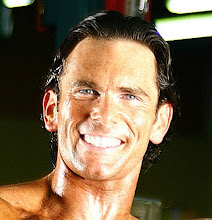 I am against the biggest loser mentality because I think it encourages the wrong approach to fat loss. A person’s goal shouldn't be to lose as much weight as possible in the shortest amount of time. It should be to lose fat and build muscle on a continual basis. Emphasizing muscle gains will yield the greatest long term results. The key phrase there is long term.
I am against the biggest loser mentality because I think it encourages the wrong approach to fat loss. A person’s goal shouldn't be to lose as much weight as possible in the shortest amount of time. It should be to lose fat and build muscle on a continual basis. Emphasizing muscle gains will yield the greatest long term results. The key phrase there is long term.There are quicker ways to get more immediate weight loss results than the approach I follow, however, rapid weight loss often equals having a worse body composition (body fat % vs lean muscle %) than what you started with. Let’s examine why.
If your program is simply focused on weight loss you are most likely not doing things very conducive to building muscle or at minimum maintaining muscle and that is where the trouble begins.
Losing muscle is a bad thing for long term results because every ounce of muscle you can gain, you raise your resting metabolic rate. That’s right; with more muscle added to your body you will burn more calories each day right out of the gate. That is why having a strong muscle building component to your program is critical for fat loss.
Following Max-OT style training will set you up to build muscle, lose fat and really transform your body. That means you may not see much movement on the scale initially and that is OK. We are concerned with long term results and over time there will be a downward trend with your weight but it will not happen over night. For this reason I don’t encourage frequent weight checking.
Here’s another cautionary tale for scale addicts. Contrary to popular belief muscle does not weigh more than fat. That is like saying a pound of bricks weighs more that a pound of feathers. A pound is a pound. Muscle is, however, more dense than fat. That means the same volume of muscle will weigh more than the same volume of fat therefore you could be a few pants sizes smaller and yet weigh almost the same as you did when you were carrying more fat. You see how that works? This is a prime example why the scale is not the best way to measure progress.
I believe a better indication of progress is how our clothes fit or if you want to get more exact you can chart inches lost or measure your actual body composition. Another good tool is visual assessments and the use of photos to see the changes made over time.
The moral of this story is concern yourself with fat loss and not simply weight loss because they are two different things. Be patient and execute a smart plan that has an emphasis on building muscle.
Believe. Achieve.
www.jeffwillet.com



Hi Jeff,
ReplyDeleteDoes the scheduled break every 8-10 weeks include a break from cardio, or just from resistance training?
Thanks!
Both cardio and resistance training. The exception is if maximum fat loss is a priority then you can still do cardio on your off week. Otherwise take a complete break.
ReplyDeleteReally amazing post. I hope more people will like your intensive work on this field. Keep up the good work. Herbalife
ReplyDelete